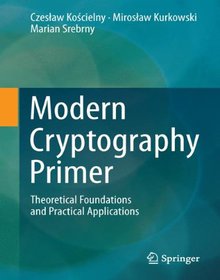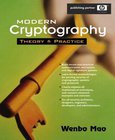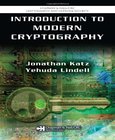Modern Cryptography Primer
Theoretical Foundations and Practical Applications

Book Details:
| Publisher: | Springer |
| Series: | Springer , Modern |
| Author: | Czeslaw Koscielny |
| Edition: | 1 |
| ISBN-10: | 3642413854 |
| ISBN-13: | 9783642413858 |
| Pages: | 238 |
| Published: | Dec 03 2013 |
| Posted: | Nov 19 2014 |
| Language: | English |
| Book format: | |
| Book size: | 6.5 MB |
Book Description:
Cryptography has experienced rapid development, with major advances recently in both secret and public key ciphers, cryptographic hash functions, cryptographic algorithms and multiparty protocols, including their software engineering correctness verification, and various methods of cryptanalysis. This textbook introduces the reader to these areas, offering an understanding of the essential, most important, and most interesting ideas, based on the authors' teaching and research experience.After introducing the basic mathematical and computational complexity concepts, and some historical context, including the story of Enigma, the authors explain symmetric and asymmetric cryptography, electronic signatures and hash functions, PGP systems, public key infrastructures, cryptographic protocols, and applications in network security. In each case the text presents the key technologies, algorithms, and protocols, along with methods of design and analysis, while the content is characterized by a visual style and all algorithms are presented in readable pseudocode or using simple graphics and diagrams.The book is suitable for undergraduate and graduate courses in computer science and engineering, particularly in the area of networking, and it is also a suitable reference text for self-study by practitioners and researchers. The authors assume only basic elementary mathematical experience, the text covers the foundational mathematics and computational complexity theory.
Download Link:
Related Books:
Modern Cryptography
Theory and Practice
Many cryptographic schemes and protocols, especially those based on public-keycryptography, have basic or so-called "textbook crypto" versions, as these versionsare usually the subjects for many textbooks on cryptography. This book takes adifferent approach to introducing cryptography: it pays much more attention tofit-for-application aspects of cryptography. It explains why "textbook crypto" isonly good in an ideal world where data are random and bad guys behave nicely.It reveals the general unfitness of "textbook crypto" for the real world by demonstratingnumerous attacks on such schemes, protocols and systems under variousreal-world application scenarios. This book chooses to introduce a set of practicalcryptographic ...
New Directions of Modern Cryptography
Modern cryptography has evolved dramatically since the 1970s. With the rise of new network architectures and services, the field encompasses much more than traditional communication where each side is of a single user. It also covers emerging communication where at least one side is of multiple users. New Directions of Modern Cryptography presents general principles and application paradigms critical to the future of this field.The study of cryptography is motivated by and driven forward by security requirements. All the new directions of modern cryptography, including proxy re-cryptography, attribute-based cryptography, batch cryptography, and noncommutative cryptography have arisen from these requirements. Focusing on these four kinds of cryptograp...
Introduction to Modern Cryptography
Principles and Protocols
Cryptography plays a key role in ensuring the privacy and integrity of data and the security of computer networks. Introduction to Modern Cryptography provides a rigorous yet accessible treatment of modern cryptography, with a focus on formal definitions, precise assumptions, and rigorous proofs.The authors introduce the core principles of modern cryptography, including the modern, computational approach to security that overcomes the limitations of perfect secrecy. An extensive treatment of private-key encryption and message authentication follows. The authors also illustrate design principles for block ciphers, such as the Data Encryption Standard (DES) and the Advanced Encryption Standard (AES), and present provably secure constructions of block c...
2007 - 2021 © eBooks-IT.org



